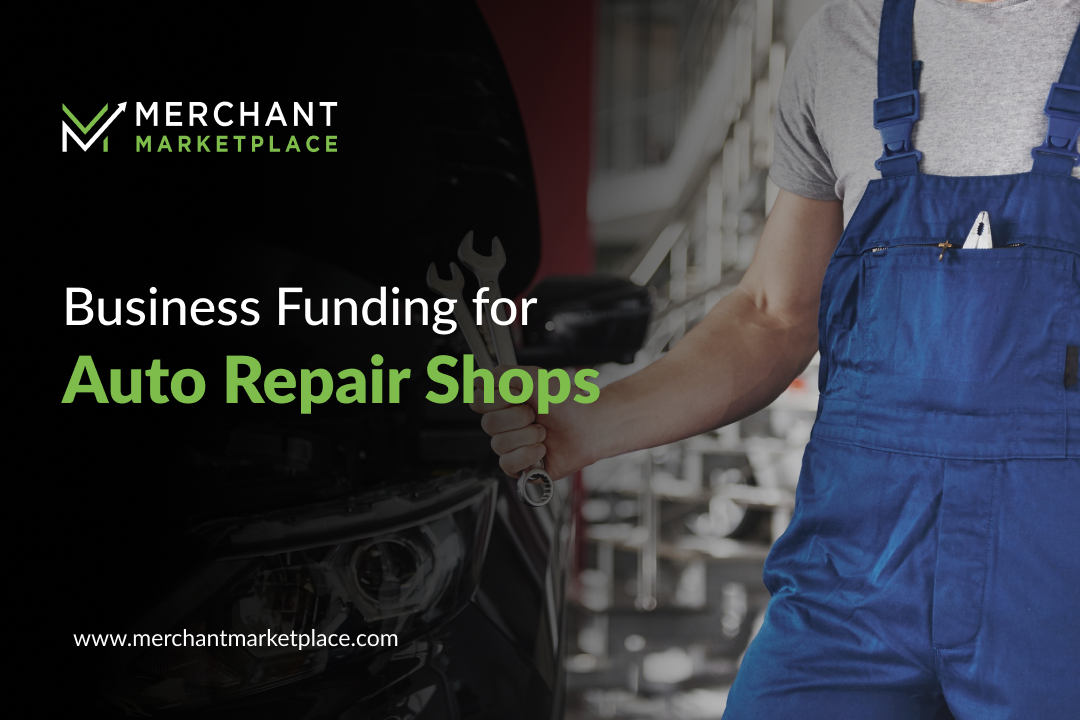Running an auto repair shop is nothing small. From fixing engines to managing cash flow, the grind never stops. But let’s face it—whether you’re looking to upgrade your tools, expand your workspace, or just keep up with the latest tech in car diagnostics, having access to capital can make all the difference.
That’s where business loans come into play. In this blog, we’ll break down three key loan options that could help you rev up your auto repair shop’s growth engine. So buckle up as we dive into the ways to finance your biz.
Three Loan Options to Consider as an Auto Repair Shop
When it comes to securing funds for your auto repair shop, not all loans are created equal. Let’s explore the pros and cons of each option so you can find what fits like a glove—or let’s say the perfect match for your biz.
Banks
Banks have been around longer than most cars on the road today. They offer traditional loans tailored for businesses, including auto repair shops. Think of these loans as the classic muscle car of financing: reliable but sometimes slow off the line.
Pros:
- Lower interest rates compared to other lenders.
- Long repayment terms, which means manageable monthly payments.
Cons:
- Strict requirements (think stellar credit scores and years of operational history).
- Approval processes take time; you can expect to wait for weeks or even months.
Good financials, collateral, and an excellent credit record are usually what banks expect to see. The interest rates chargeable vary between 4% to 13% depending on how good your credit and the size of the loan are. This is the type of loan if you have the time and patience.
Merchant Cash Advance
If you need quick cash without jumping through hoops, an MCA might be your ticket. MCAs work by giving you a lump sum upfront in exchange for a percentage of your future sales. It’s kind of like borrowing money from tomorrow to fix problems today.
Benefits:
- Fast funding—often within days.
- No strict credit checks; lenders focus more on your revenue stream.
Drawbacks:
- High costs. Factor rates can skyrocket, making repayment pricier than expected.
- Risky if your revenue dips unexpectedly since repayments are tied directly to sales.
Though MCAs do not suit every kind of requirement, they’re fitting when you need funds urgently, so don’t mind paying extra for convenience.
Small Business Administration (SBA) Loan Programs
The Small Business Administration is more than just a government department; it’s actually a very beneficial deal for little businesses like yours. The SBA has formed partnerships with banks and nonprofit organizations to provide guaranteed loans that will support entrepreneurial projects.
Types of SBA Loans:
- 7(a) Loan: This bad boy covers almost anything under the hood—from working capital to equipment purchases. Loan amounts can be claimed up to $5 million with interest rates ranging from 6% to 8%
- Microloans: Need less cash? Microloans cap at $50k and are great for smaller projects or short-term needs.
Eligibility:
You’ll need to prove you’re running a legit operation with growth potential. The SBA also requires you to exhaust other financing options before applying.
Pros & Cons:
- Pro: Competitive interest rates and long repayment terms.
- Con: Paperwork-heavy applications and slower funding timelines.
For many auto repair shops, SBA loans strike the right balance between affordability and flexibility.
Alternative Lender Loans
Alternative lenders enable the owner of an auto repair shop to obtain fast and quick finance. They differ from banks in how they disburse loans. Real quick and within days or sometimes hours instead of a long wait as is normal in the case of banks.
What Are Alternative Lenders?
They are non-bank financial companies that provide quicker, easier access to funding. Think of them as the express lane compared to the slow-moving line at a bank.
Types of Loans Offered
- Term Loans: Lump sum paid back over time with fixed or variable rates. Great for big purchases like equipment.
- Business Lines of Credit: These are revolving funds you can tap into as needed. Perfectly designed to smoothen cash flow management.
- Equipment Financing: Capital that is purely to purchase or upgrade tools or machinery.
Pros:
- Fast funding—often within 24-48 hours.
- Easier approval, even with lower credit scores.
- Tailored options for specific needs.
Cons:
- Higher interest rates and fees.
- Shorter repayment terms can mean bigger monthly payments.
- Less regulation increases the risk of unfavorable terms.
For business loans for auto repair shops, they’re a speedy solution—but always weigh the trade-offs before signing on the dotted line.
The Mechanics of Business Loans for Auto Companies
Now that we’ve covered the big three, let’s zoom in on how different types of loans really work for auto repair shops.
Commercial Bank Loans
In commercial banks, loans are sewn together for varied segments of traditional financial practice. They lend a fixed amount of cash with a predictable repayable schedule.
Loan Terms:
Different loan purposes will get you different lengths of repayment: repayment could last for a period of 5 years to 25 years. For example, the heavy machinery purchase may afford the applicant a longer term of loan than covering payroll expenses.
Interest Rates:
The interest rate would range between 3 and 10%. Factors considered include the credit score and types of collateral placed.
Repayment Structures:
Most commercial loans are amortized: that is, the loan is paid back over time with interest being the cost of maintaining the loan. It’s simple, but you’re obligated to make regular payments whether the business is surging into glory or heading for the ground.
Business Line of Credit
A business line of credit is like having an emergency reserve that you can dip into whenever necessary. Rather than a one-time cash lump amount, lines of credit give you a revolving pool of funds up to a certain limit.
How It Works:
You may be approved for a $50,000 line of credit, but you only borrow what you need and pay interest only on the amount utilized. Once repaid, the full limit becomes available again.
Benefits:
- Flexibility to handle unexpected costs, like replacing broken diagnostic machines.
- Ideal for any ongoing operational requirements like restocking inventories or marketing events to be held at certain seasons of the year.
Lines of credit generally have much higher rates of interest than those given in a conventional loan, but the flexibility of credit makes one still want to consider this option.
Small Business Association (SBA) Loans
Let’s take another spin around SBA loans because they deserve a closer look.
7(a) Loans:
If there is anything that would tilt the scales in the favour of auto repair shop owners, it is 7(a) loans that have been accompanied by wide-ranging loan limits and flexible usage rules. Depending on the purpose of the loan, the repayment term may differ in most cases; expect terms to be anywhere between 7 and 25 years.
Microloans:
Got a smaller project in mind? Microloans cap at $50,000 and typically carry lower interest rates in comparison. They’re perfect if you have a startup or let’s say you have a shop needing modest upgrades.
Application Process:
Be prepared for paperwork galore. From tax returns to business plans, the SBA application process is pretty tough, but rewarding if you ride it out.
Frequently Asked Questions (FAQs)
- Why Might an Automotive Repair Business Require Additional Funding?
Auto repair shops often require additional funding for reasons like:
- Purchasing expensive equipment.
- Expanding facilities to accommodate more customers.
- Investing in digital marketing to attract younger clients.
- What Are the Top Three Loan Options to Consider for an Auto Repair Shop?
Recap time! Your top contenders are:
- Traditional bank loans for low-interest, long-term financing.
- SBA loans for government-backed reliability.
- Alternative lender loans for speed and flexibility.
- Why Might Auto Repair Shop Owners Consider Loans from Alternative Lenders?
Alternative lenders shine when speed matters. Plus, their needs are not strict, making way for new businesses or individuals with a less-than-good credit history.
Keeping Up with Industry Trends
The automobile repair industry is much faster today than ever before. Advanced techs like Electric cars and hybrid models, require mechanics to change or risk your biz being left behind the curve. Competitive positioning requires investment, not only in that skill but also in the tools and infrastructure.
Properly identifying the right loan options helps position to benefit during the transformation. After all, every successful pit stop leads to victory lane.
Conclusion
Making the right financing choice is how to develop your auto repair workshop. Whether low-rate bank loans, flexible SBA programs, or fast cash from alternative lenders, there is a solution for everything. Investing in the right amounts along with the right loan can help keep up with the fast-changing auto industry in terms of tools, tech, and expansion.
Time to take your shop to the next level? Let’s kick off the Funding!




